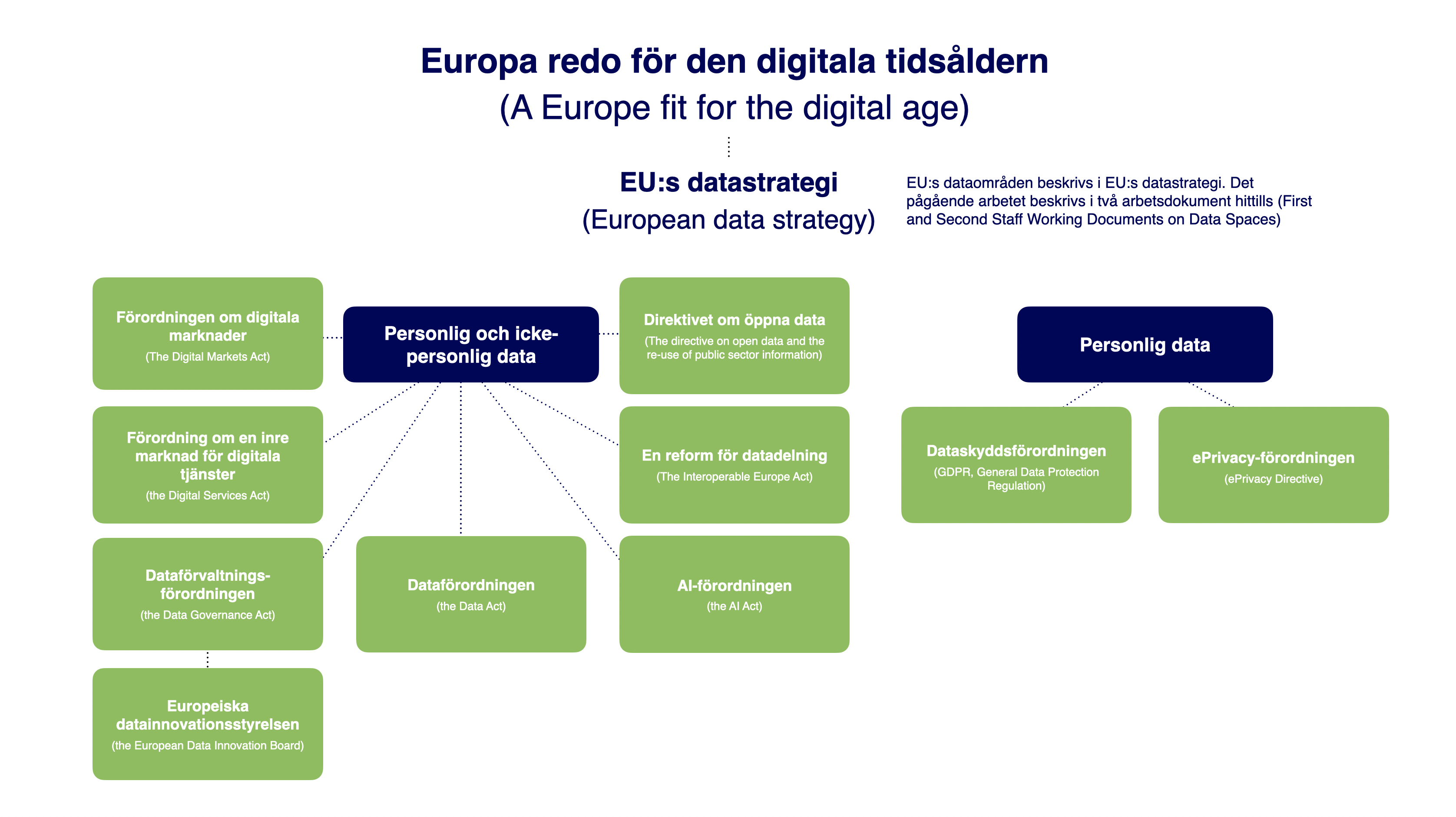EU Data Spaces: Building a Single European Market for Data
Data is reshaping our daily life, driving innovation and efficiency, across all sectors, especially through AI advancements. The European data strategy (2020) aims to create a secure, single market for data, benefiting businesses and citizens while ensuring privacy, security, and ethics. Common European data spaces are essential for technological excellence. Building interoperable data spaces across EU borders supports the mobile labour market. For example, the Common European public administrations data spaces and the Common European Skills Data Space will reshape the labour market by creating opportunities of building coherent digital infrastructures that facilitate career changes and skill supply and development.
What are the Data Spaces?
Common European data spaces will transform the EU economy and play a vital role in the green and digital transition across ecosystems. Key priorities include cross-sectoral data interoperability, fair and transparent access, and trustworthy governance adhering to European rules and values, data protection, consumer protection, and ethical standards.
"The common European data spaces brings together relevant data infrastructures and governance frameworks in order to facilitate data pooling and sharing."
The Difference Between Open Data Portals and Data Spaces: The Picknic Example
Data spaces differ from traditional open data portals. The open data generated or held by government entities enriches European data spaces by enhancing quality, interoperability, and cross-border reuse, though not all can be shared openly. Thus, various regulations provide a broader framework for access, reuse, and distribution.
To clarify the difference between data portals and data spaces, the European Commission made an analogy to sharing food at a picnic. In open data portals, exchanges follow the host's rules, whereas in data spaces, exchanges follow shared rules agreed upon by participants. This enables complex data transactions, including specifying limits on how and for what purposed protected data can be reused.
Open data complements data spaces, fostering innovative uses of open and non-open data, and enabling the creation of new open data.
Staff Working Documents on Data Spaces: State of Play
There are two Staff Working Documents on Data Spaces, published by far by the European Commission, which are presenting an overview of the state of play of the EU Data Spaces.
The first document published on 23 February 2022 outlined 9 common European data spaces and key features of the data spaces, while the second one, published in January 2024, provided an overview of the status of the common European data spaces (already 14 data spaces) with the latest updates of the EU legislative framework for data spaces, as well the progress of each sector- or domain-specific common European data space.
Since the publication of the second Staff Working Document (SWD), there have been some significant milestones:
- the entry into application of the Data Governance Act
- the adoption of the Data Act
- the adoption of the implementing act on high-value datasets (Open Data Directive)
- the entry into force of the AI Act
In addition, it presents the state of play of data-space related EU support actions, including:
- sector- and domain-specific initiatives
- the Data Spaces Support Centre (DSSC)
- relevant European Digital Infrastructure Consortia (EDICs) under the policy programme ‘Path to the Digital Decade’
- ongoing work on smart open-source middleware (Simpl)
- standards and interoperability
Funding can be allocated through the programs among others:
- Digital Europe (contact point in Sweden is the Agency for Digital Government (Digg))
- Horizon Europe: (contact point is Sweden’s Innovation Agency (Vinnova))
- In the context of the EU’s Recovery and Resilience Facility (RRF)
Significant progress has been made in sector- and domain-specific data spaces, but the pace varies. Strong commitment from all stakeholders is crucial to realise the vision of establishing a genuine single market for data.
The Regulatory Framework
The European strategy for data is one of the cornerstones of the EU’s digital strategy. The data strategy envisions strong synergies between the data legislation and the respective deployment actions to mutually reinforce each other.
The regulatory framework for the digital economy strongly builds on:
- the data strategy, in particular the Data Governance Act, the Data Act and the implementing act on high-value datasets.
- as regards personal data, this enabling legislation for the development of common European data spaces builds on a solid and trusted legislative framework, notably the GDPR and the ePrivacy Directive.
Other important developments in market such as the Digital Markets Act (DMA) and the Digital Services Act (DSA) acts contribute towards completing the EU-level regulatory toolbox.
 Map over the regulatory framework of the EU Digital Economy, where the Data Spaces are playing a pivotal role.
Map over the regulatory framework of the EU Digital Economy, where the Data Spaces are playing a pivotal role.
The Next Steps
With key legislative instruments now approved and coming into effect, the focus has shifted to implementation. In this phase, standards will be crucial for ensuring interoperability and maximizing the potential of data sharing.
- Implementation: the Commission will focus on implementing the enabling legislative instruments
- Deployment: stakeholders of the common European data spaces will continue to work towards implementing their key actions; a version of the blueprint every six months
- Continuous support: through its funding programmes, the Commission will continue in 2024-25 to support the development and roll-out of common European data spaces.
More Information
- EU Data Spaces Skills: Bridging Skills and Education
- Method and Process Support for Open Data Sharing
- Collaboration with Sundsvall Municipality on Open Data
- The entire Second Staff Working Document can be accessed here
- When open data meets data spaces
- The entire First Staff Working Document can be accessed here
- European data strategy
- Simpl - Clarifications